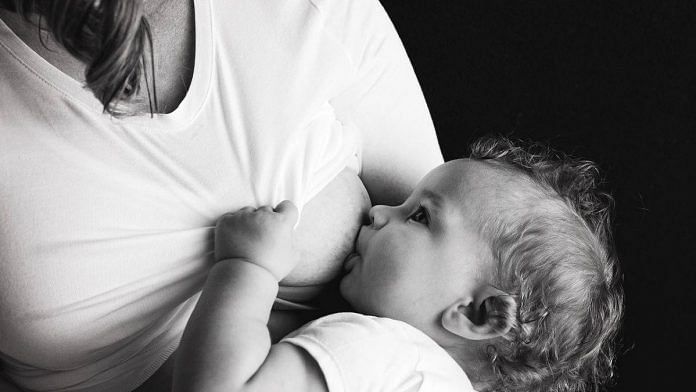New Delhi: Lactating mothers, who have been administered the Moderna or Pfizer mRNA Covid vaccines, can safely breastfeed their children, according to a new study that found no detectable levels of the mRNA vaccine in the breastmilk of vaccinated mothers.
The study by researchers from the University of California, San Francisco, was published in the journal JAMA Paediatrics Tuesday, and provides important early evidence to support the recommendations that individuals who receive the Covid-19 mRNA-based vaccine should not stop breastfeeding.
While Messenger RNA (mRNA) vaccines against Covid-19 have been approved after clinical trials that showed them to be safe for the person receiving the shots, there is a paucity of data regarding vaccine safety for pregnant or lactating women, since they were excluded from vaccine trials.
This is concern only for mRNA vaccines because this the first time that the world is using mRNA vaccine technology, which is why there was no data on whether mRNA can be present in breastmilk of lactating mothers who have received the shots. Other vaccine technologies have been safely used on pregnant or lactating women for decades, so there safety is well-established.
While most vaccines introduce a whole (killed/inactivated) or fragmented pathogen into the body to teach the immune system to identify it when an actual infection occurs and mount an immune response, mRNA vaccines such as those manufactured by Moderna and Pfizer start the process from a step earlier.
These vaccines introduce a fragment of a messenger RNA (ribonucleic acid) that codes for and teaches the body to make a protein that is characteristic of the pathogen — using the body’s own translation machinery — and then teaches the immune system to respond to it.
According to the research team, many mothers have declined vaccination or decided to discontinue breastfeeding due to concerns that the mRNA vaccine dose may alter the composition of human milk.
Although the World Health Organization recommends breastfeeding individuals to be vaccinated (for all vaccine technologies) and does not advise cessation of breastfeeding following vaccine administration, so far there was no direct data to support the recommendation.
“To address this knowledge gap, we analyzed milk samples to determine if vaccine-related mRNA was detectable in human milk after vaccination.” the researchers wrote in their study.
The researchers, however, noted that this was a preliminary study that involved few volunteers, and needed to be repeated with a bigger population to better estimate the effect of these vaccines on breastmilk.
Also read: Would you enroll your kid for Covid vaccine trial? Find out why these parents have
No mRNA vaccine detected in breastmilk
The team from the University of California, San Francisco, took breastmilk samples from seven breastfeeding mothers who volunteered for the study. Their children ranged in age from one month to three years.
Thirteen milk samples were collected, within four to 48 hours of administration of the mRNA vaccines. Five of the volunteers had received the Pfizer (BNT162b2) vaccine and two had received the Moderna (mRNA-1273) vaccine.
None of the samples showed detectable levels of vaccine mRNA in any component of the milk.
The researchers said that the results showed that vaccine related mRNA is not transferred to the infant and that lactating mothers who receive the Covid-19 mRNA-based vaccine
should not stop breastfeeding.
The team added that any residual mRNA, that escaped detection due to the limits of testing, would get degraded by the infant’s gastrointestinal system
The team, however, noted several limitations in the study. The study sample size was very small, with just two participants having received the Moderna vaccine.
Moreover, milk samples were collected by the participants at home, and frozen at home until arrival at the laboratory. Improper storage of the samples may have affected mRNA stability.
The researchers said that data from larger populations are needed to better estimate the effect of these vaccines on breast milk.
The results of the study will also be of interest in India, since mRNA vaccines are expected to soon be available in the country. Cipla Ltd has already received an import license for restricted emergency use of Moderna’s Covid-19 messenger RNA vaccine in India, which have been donated by the US-based firm.
India is also expecting seven million doses of the Moderna mRNA Covid vaccine through the international Covax arrangement, but there is no clarity yet on when the vaccines may arrive, primarily because the question of indemnity waiver is yet to be decided.
(Edited by Poulomi Banerjee)
Also read: CoWin goes global, 76 countries want to use India’s Covid vaccination platform software



